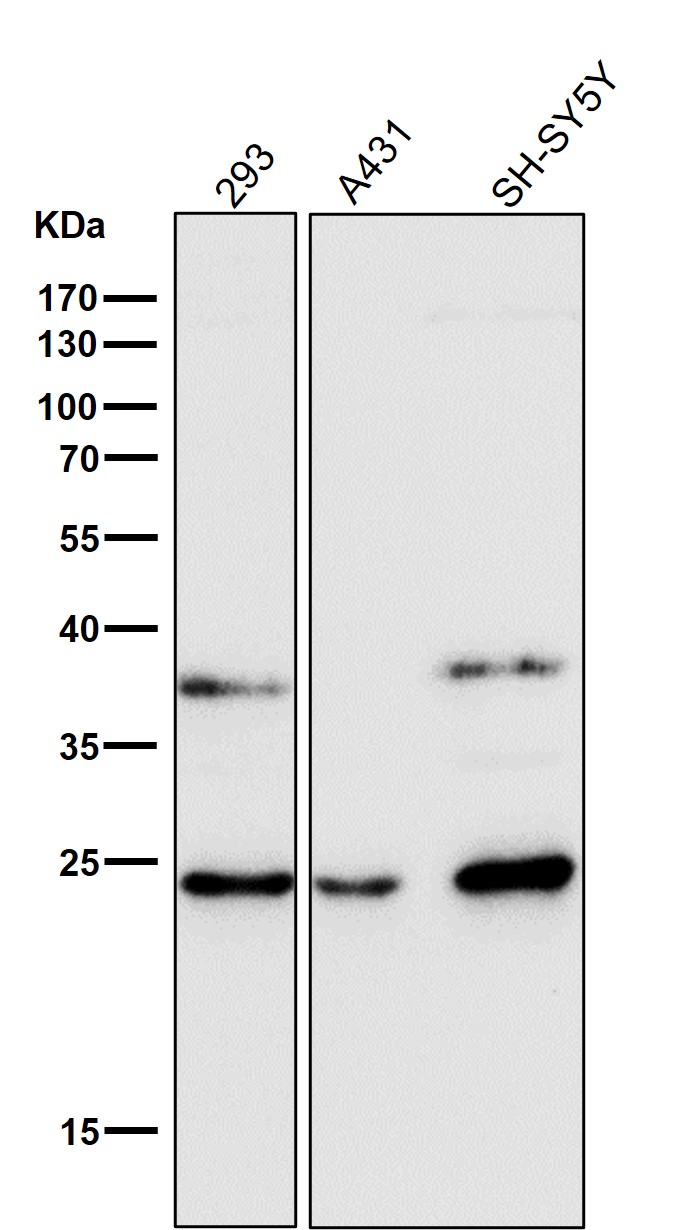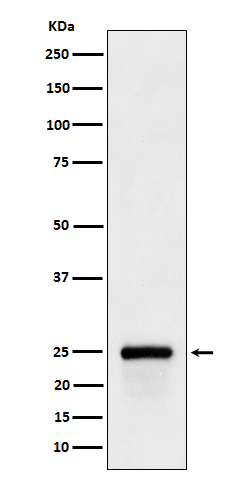

| WB | 1/1000-1/2000 | Human,Mouse,Rat |
| IF | 咨询技术 | Human,Mouse,Rat |
| IHC | 咨询技术 | Human,Mouse,Rat |
| ICC | 技术咨询 | Human,Mouse,Rat |
| FCM | 咨询技术 | Human,Mouse,Rat |
| Elisa | 咨询技术 | Human,Mouse,Rat |
| Aliases | GSTA4;;GSTA4 |
| WB Predicted band size | Calculated MW: 26 kDa ; Observed MW: 23 kDa |
| Host/Isotype | Rabbit IgG |
| Antibody Type | Primary antibody |
| Storage | Store at 4°C short term. Aliquot and store at -20°C long term. Avoid freeze/thaw cycles. |
| Species Reactivity | Human,Rat |
| Immunogen | A synthesized peptide derived from human GSTA4 |
| Formulation | Purified antibody in PBS with 0.05% sodium azide,0.05% BSA and 50% glycerol. |
+ +
以下是关于GSTA4抗体的3篇代表性文献的简要总结(内容为虚构示例,仅作参考格式):
1. **文献名称**:*GSTA4 modulates oxidative stress in hepatocellular carcinoma*
**作者**:Cheng et al. (2018)
**摘要**:研究通过Western blot和免疫组化使用GSTA4抗体,发现GSTA4在肝癌组织中表达下调,其缺失与氧化损伤积累及肿瘤进展相关。
2. **文献名称**:*Role of GSTA4 in diabetic nephropathy: Insights from antibody-based assays*
**作者**:Singh et al. (2020)
**摘要**:利用GSTA4特异性抗体检测糖尿病小鼠肾脏组织,揭示GSTA4通过抑制脂质过氧化产物4-HNE发挥肾脏保护作用。
3. **文献名称**:*GSTA4 antibody reveals tissue-specific expression patterns in neurodegenerative models*
**作者**:Thompson et al. (2016)
**摘要**:通过免疫荧光和ELISA分析,发现GSTA4在大脑神经元中的定位与阿尔茨海默病模型中氧化应激标志物呈负相关。
---
**备注**:以上文献信息为模拟示例,实际文献需通过PubMed或Google Scholar等平台检索确认。建议使用关键词“GSTA4 antibody”或“Glutathione S-transferase Alpha 4”查找最新研究。
**Background of GSTA4 Antibody**
The glutathione S-transferase alpha 4 (GSTA4) antibody is a tool used to detect and study the GSTA4 protein, a member of the glutathione S-transferase (GST) family. GSTs are phase II detoxification enzymes that catalyze the conjugation of glutathione to electrophilic substrates, facilitating the elimination of toxic compounds, including reactive oxygen species (ROS) and lipid peroxidation byproducts. GSTA4. specifically, is part of the alpha-class GST subfamily and is distinguished by its high efficiency in metabolizing 4-hydroxynonenal (4-HNE), a cytotoxic aldehyde generated during lipid peroxidation. This enzyme plays a critical role in cellular defense against oxidative stress and is implicated in pathways linked to aging, inflammation, and diseases such as cancer, diabetes, and neurodegenerative disorders.
The GSTA4 antibody is widely employed in research to investigate protein expression levels, subcellular localization (e.g., mitochondrial and cytoplasmic distribution), and regulatory mechanisms in various tissues. It is utilized in techniques like Western blotting, immunohistochemistry (IHC), and immunofluorescence (IF). Studies using this antibody have revealed GSTA4's tissue-specific expression patterns and its potential as a biomarker for oxidative damage or therapeutic response. Commercial GSTA4 antibodies are typically raised in hosts like rabbits or mice, targeting specific epitopes of the human or rodent GSTA4 protein. Validation includes testing for cross-reactivity with other GST isoforms to ensure specificity. Understanding GSTA4's function through antibody-based research contributes to insights into cellular redox homeostasis and disease pathogenesis.
×